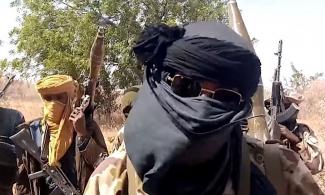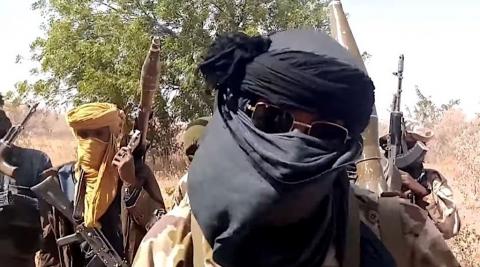
The bandits’ leader in an interview with BBC Africa Eye, when asked what they did with the money, simply stated that they used the money to acquire more rifles and other deadly weapons for subsequent operations.
One of the notorious bandits’ leaders who carried out the abduction of nearly 300 schoolgirls at the Government Girls Secondary School in Jangebe town in Zamfara State in February 2021 have revealed that the Nigerian government coughed up N60million cash before they (the bandits) freed the girls.
The bandits’ leader in an interview with BBC Africa Eye, when asked what they did with the money, simply stated that they used the money to acquire more rifles and other deadly weapons for subsequent operations.

The interview is part of the BBC documentary, released on Friday, and titled, The Bandits’ Warlord of Zamfara.
Jangebe is in the Talata Mafara Local Government Area of Zamfara State.
On February 26, 2021, the bandits attacked the GGSS in Jangebe and kidnapped hundreds of students.
They were, however, released a few days later.
SaharaReporters had reported how in 2019, the state government signed a peace agreement with the gunmen.
About 15 brand new Hilux vehicles and cash gifts were also given to leaders of different “repentant” gangs of bandits by the governor in 2020.
But despite all these, communities in the state are still being attacked and residents kidnapped and killed.
In the documentary, the BBC Africa Eye has spent more than two years tracking down and speaking to some of the most notorious bandit warlords in Zamfara.
At huge personal risk, a young Nigerian journalist and law student, Yusuf Anka, visited bandit leaders in remote encampments across the state—including one of the men who, in February 2021, abducted nearly 300 girls from a high school in Jangebe.
In a series of shocking encounters with both victims and perpetrators, the film lays bare the full horror of the violence that has taken hold across the north-west.
It makes clear that, despite the bravery of the security forces, the Nigerian state is failing to provide basic security to many of its citizens, reveals just how lucrative the kidnap-for-ransom business has become, and warns the country that this crisis now contains elements of an ethnic conflict between Hausa and Fulani.
The film’s most dramatic revelations concern the abduction of the nearly 300 girls who were seized by bandits from a government-run high school in Jangebe in February 2021.
The bandits behind the abduction have never been caught and have never previously spoken to the media, but the BBC team tracked down one of the men who led the attack on the school. He claims on camera that the bandits were paid a ransom of 60 million Naira from the Nigerian government for the release of the girls. “What did you do with the money?” asks Anka. The reply comes back immediately: “We bought more rifles.”
The film also includes the only media interview ever granted by Ado Aleru, a notorious Fulani gang leader who is wanted by the Katsina police for leading a massacre in the village of Kadisau in June 2020.
Aleru has been at the centre of recent controversy in Nigeria after he was “turbaned” and given the title ‘Chief of the Fulani’ by an Emir in Zamfara state.
Asked on camera how many people he had kidnapped, Aleru told the BBC: “My men do that; I just go and kill them.”
Aleru remains vague about his political objectives, beyond a general bitterness towards Hausa communities and a resentment of the Nigerian government.